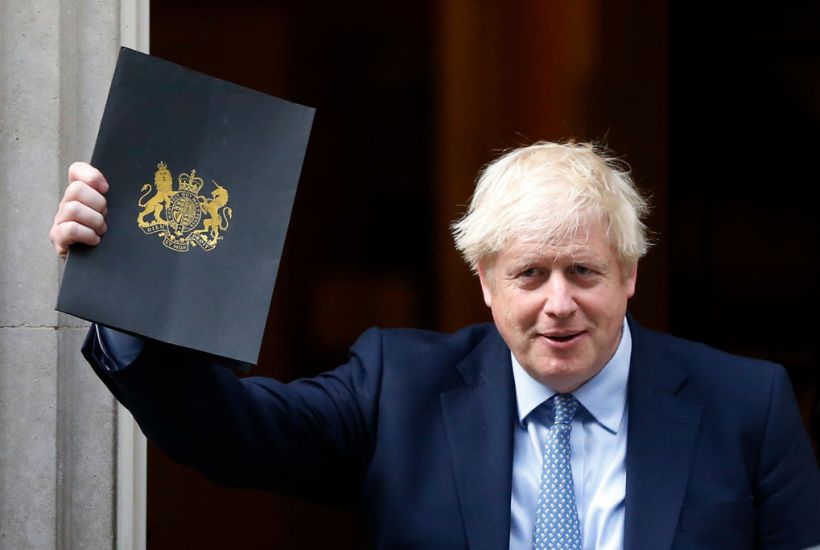The Supreme Court’s judgement is the latest constitutional perversion after the Benn act. But ironically it may assist the Government in achieving its objective of Britain leaving the EU by 31 October, without having to seek an extension to the Article 50 process.
In paragraph 34, the Supreme Court states that its ‘proper function’ under our constitution is to give effect to the separation of powers (which justifies court intervention in relation to prorogation). Then, in what appears to be an innocuous sentence in paragraph 55, it says that it is to be “remember[ed] always that the actual task of governing is for the executive and not for Parliament or the courts.”
Yet the Benn Act manifestly contradicts this principle. It dictates how the Government must conduct negotiations with a foreign body, the EU, to the extent of obliging the Prime Minister to write specifically worded letters and accept whatever extension it offers when certain conditions are not met. In the situation when the conditions are not met (i.e. if the House of Commons has not voted for a deal or approved exit without a deal), the Prime Minister then has no choice but to act as instructed, whether he wants to or not. At that point, in what sense is he governing? The Prime Minister becomes a mere puppet of Parliament, which to all intents and purposes is the governing body.
The judgement also outlines another fundamental constitutional principle: Parliamentary accountability. In paragraph 46 it says:
“Ministers are accountable to Parliament through such mechanisms as their duty to answer Parliamentary scrutiny of the delegated legislation which ministers make. By these means, the policies of the executive are subjected to consideration by the representatives of the electorate, the executive is required to report, explain, and defend its actions, and citizens are protected from the arbitrary exercise of executive power.”
But if the legislature takes on the functions of the executive, without taking office, then to whom is it accountable for its policies? To whom does it report, explain, and defend its actions to? Itself? Which of its members speaks on its behalf?
To show the absurdity of the current situation, suppose the Brexit select committee wanted to summon someone to scrutinise the effects of an extension to Article 50 to 31 January 2020 (or beyond). Who would it call? Perhaps it ought to call Hilary Benn, whose name is attributed to the Act that mandates the policy. But Hilary Benn happens to be the chairman of the committee. The Benn Act then arguably destroys the very principle of parliamentary accountability, which the Supreme Court cited as a cornerstone of the British constitution.
If the Benn Act is unconstitutional, the next question to ask is whether the Court has the ability to rule that it violates constitutional norms and provide a legal remedy.
Again, the answer lies in the present judgment. In discussing the justiciability of prerogative powers, paragraph 35 says that:
“The [first] issue is whether a prerogative power exists, and if it does exist, its extent. The second is whether, granted that a prerogative power exists, and that it has been exercised within its limits, the exercise of the power is open to legal challenge on some other basis.”
But there is no reason why this should not extend to virtually any claimed power – the courts can decide if the power exists, and if it does, what is its extent. This is one of the normal functions of a court. Why shouldn’t the power of parliament to enact laws be examined too and subject to scrutiny and analysis by the courts and its limits determined?
The counter argument to this is that the Benn Act is a proceeding of Parliament so is protected from court scrutiny by Article IX of the Bill of Rights 1689 (which the Court ruled does not cover prorogation). Yet it could be argued that this Article, which is a significant part of our constitution, cannot be used as an instrument itself to destroy the constitution. By way of comparison, judges ruled that the Statute of Frauds 1677 itself could not be pleaded as a defence against accusation of fraud.
If you maintain that Article IX is absolute, then it would mean that Parliament could legislate to abolish judicial review, open justice, the courts or even Parliament itself. This would do unlimited damage and destruction to the constitution, all without the courts having any say.
Before this judgment, I believed the principle of parliamentary sovereignty meant that parliament could do this. Now I am not so sure; the Court has taken it upon itself, under the common law, to be the guardian of certain constitutional principles. It could be argued then that while it has a constitutional duty to supervise the exercise of prerogative power, it also has a duty to supervise the power of parliament.
The sovereign was – before this ruling, at least – the ultimate limit on the use of prerogative power in the absence of statute. The Court in its judgment at paragraph 30 states that it expresses no view on the matter of whether the Queen was obliged to accept the advice to prorogue. Yet it then contradicts this by claiming that the Prime Minister was “the only person with power…to have regard to all relevant interests, including the interests of Parliament”.
This reduces the monarch to a nodding dog, who simply acquiesces to wherever her ministers drive the nation and its institutions. The Court has usurped the role of the constitutional monarch and invented a novel role for itself, essentially transforming Britain into a democratic republic. If it rules against prorogation today, then is it to challenge the Royal Assent, by which bills become law, tomorrow? What if the Government were, in an exceptional case, to advise the Queen to refuse such assent?
Before the Cooper-Letwin Act and the Benn Act, the House of Commons and the House of Lords were the checks on the unconstitutional power of the Crown in Parliament. The Government should now test whether the Court will apply with consistency the reasoning that it used to justify its new constitutional powers in relation to prorogation.
If the matter of prorogation is now justiciable because the Court can protect Parliamentary sovereignty and accountability as part of the fundamental separation of powers, then why should the Court not also intervene when that principle is violated by a Parliament which presumes to usurp the executive by taking upon itself the actual task of governing?
The way is now open for Boris Johnson to refuse to comply with the Benn Act on the legitimate ground that the Act is unconstitutional and that the courts (and ultimately the Supreme Court) will agree; and even if the Court won’t go so far as declaring it an actual nullity, then at least they will refuse to enforce it.
Alexander Pelling-Bruce is a political researcher
Got something to add? Join the discussion and comment below.
Get 10 issues for just $10
Subscribe to The Spectator Australia today for the next 10 magazine issues, plus full online access, for just $10.




















Comments
Don't miss out
Join the conversation with other Spectator Australia readers. Subscribe to leave a comment.
SUBSCRIBEAlready a subscriber? Log in